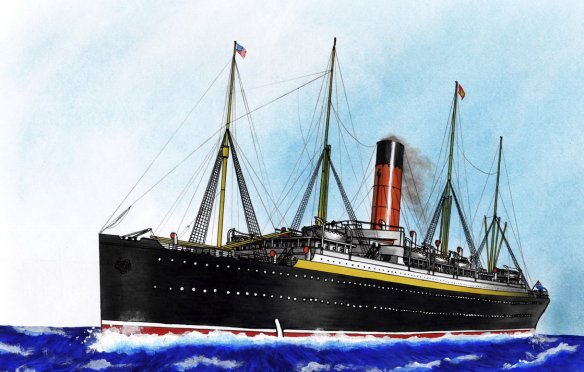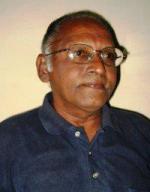
R.M.S. Carpathia by Scottvisnjic
At full speed it took four hours for the RMS Carpathia, working her way through dangerous ice fields in the dark, to reach the RMS Titanic. At 4 am, when RMS Carpathia arrived at the scene, RMS Titanic had already sunk. Carpathia took on around 700 survivors of the disaster from Titanic‘s lifeboats. It rescued the last of the survivors in the lifeboats by 9:15 am.

Members of a rescue crew in a whaling boat attempt to retrieve the floating body of a Titanic victim. Photograph by Joseph H. Bailey. (Source: channel.nationalgeographic.com)
Out of the 2,224 people aboard RMS Titanic, 710 were saved, leaving 1,517 dead.
The figures below are from the British Board of Trade report on the disaster.
| Passenger category | Number aboard | Number saved | Number lost | Percentage saved | Percentage lost |
|---|---|---|---|---|---|
| Children, First Class | 6 | 5 | 1 | 83.4% | 16.6% |
| Children, Second Class | 24 | 24 | 0 | 100% | 0% |
| Children, Third Class | 79 | 27 | 52 | 34% | 66% |
| Women, First Class | 144 | 140 | 4 | 97% | 3% |
| Women, Second Class | 93 | 80 | 13 | 86% | 14% |
| Women, Third Class | 165 | 76 | 89 | 46% | 54% |
| Women, Crew | 23 | 20 | 3 | 87% | 13% |
| Men, First Class | 175 | 57 | 118 | 33% | 67% |
| Men, Second Class | 168 | 14 | 154 | 8% | 92% |
| Men, Third Class | 462 | 75 | 387 | 16% | 84% |
| Men, Crew | 885 | 192 | 693 | 22% | 78% |
| Total | 2224 | 710 | 1514 | 32% | 68% |
Captain Edward Smith, First Officer William Murdoch, Thomas Andrews, the naval architect of RMS Titanic, Jack Phillips, the senior Marconi radio operator, were among those lost with the sinking ship.
Harold Bride after being picked up by the RMS Carpathia assisted Harold Cottam in dealing with a constant exchange of messages in the following hours.
According to Violet Jessop, while on board the RMS Carpathia, a woman without saying a word grabbed the baby Violet was holding and ran off with it.
After being picked up by the RMS Carpathia, Bruce Ismay was taken to the ship’s doctor, Frank Mcgee’s cabin. Ismay gave Captain Rostron a message to send to White Star Line’s New York office:
“Deeply regret advise you Titanic sank this morning after collision with iceberg, resulting in serious loss of life. Full particulars later.“
During the entire journey to New York on board RMS Carpathia, Ismay never left Dr. Mcgee’s cabin. He did not eat any solid food and had to be kept under the influence of opiates.
A fellow survivor Jack Thayer, a First-Class passenger after visiting Ismay said:
“[Ismay] was staring straight ahead, shaking like a leaf. Even when I spoke to him, he paid absolutely no attention. I have never seen a man so completely wrecked.”
The RMS Carpathia finally reached New York on April 18, 1912. Guglielmo Marconi, visited his exhausted radio operators on board. He himself had plans to to cross the Atlantic on the ill-fated RMS Titanic, but had changed his plans. He arrived In New York on the RMS Lusitania.
In New York, Bruce Ismay was hosted by Philip Franklin, vice-president of the company. Ismay also received a summons to appear before a Senate committee headed by Republican Senator William Alden Smith the following day and a few weeks later he appeared before the British Board of Trade chaired by Lord Mersey.
Bruce Ismay testified that as the ship was in her final moments, he was working at an oar, his back to the ship so as to avoid watching his creation sink beneath the waters of the North Atlantic. During the United States Inquiry he assured that all the vessels of the International Mercantile Marine Company would be equipped with lifeboats in sufficient numbers for all passengers.
After the inquiry, Ismay and the surviving officers of the RMS Titanic returned to England aboard RMS Adriatic. Ismay’s reputation was irreparably damaged and he maintained a low public profile after the disaster. London society ostracized Ismay for life and labelled him one of the biggest cowards in history.
The American and the British press the American and the British press Bruce Ismay for deserting the ship while women and children were still on board. Some newspapers, even conjectured that Ismay jumped into the boat, despite there being women still near the lifeboat. Some papers called him the “Coward of the Titanic” and others named him as “J. Brute Ismay“ and suggested that the White Star flag be changed to a yellow liver.
Ben Hecht, then a young journalist in Chicago, wrote a scathing poem titled “Master and Man” for the Chicago Journal contrasting the actions of Captain Edward Smith, the master of RMS Titanic who had just gone to an icy grave with his ship along with a majority of its passengers, and J. Bruce Ismay, chairman and managing director of the White Star Line of steamship safe on the rescue ship RMS Carpathia.
Master and Man
by Ben Hecht
The Captain stood where a
Captain should
For the Law of the Sea is grim;
The Owner romped while the ship was swamped
And no law bothered him.
The Captain stood where the Captain should
When a Captain’s ship goes down
But the Owner led when the women fled,
For an Owner must not drown.
The Captain sank as a man of Rank,
While his Owner turned away;
The Captain’s grave was his bridge and brave,
He earned his seaman’s pay.
To hold your place in the ghastly face of Death on the Sea at Night
Is a Seaman’s job, but to flee with the mob
Is an Owner’s Noble Right.
However, some newspapers claimed Ismay’s escape was justified since he was a passenger just like any other passenger on board the RMS Titanic. Some journalists maintained that Ismay bound by the dictum, “Women and children first” assisted many women and children himself. At the inquiry Bruce Ismay and first-class passenger William Carter said they boarded Collapsible C lifeboat only after there were no more women and children near that lifeboat.
 The above news “J. Bruce Ismay Tells in Whispers How He Escaped Death By Leaving Sinking Titanic in Lifeboat With Women” in The Times Dispatch reminds me of an apocryphal account of how Violet Jessop got into the lifeboat:
The above news “J. Bruce Ismay Tells in Whispers How He Escaped Death By Leaving Sinking Titanic in Lifeboat With Women” in The Times Dispatch reminds me of an apocryphal account of how Violet Jessop got into the lifeboat:
Violet watched patiently as the crew members loaded the passengers on to lifeboat Later, they called out “Are there any more women before this boat goes out?”
Bruce Ismay, who had already got into the boat loaded with women saw Violet and said: “Come along; jump in.“
Violet replied: “I am only a stewardess.“
Ismay said: “Never mind – you are a woman; take your place.“
Just as the boat was being lowered, an officer of the Titanic gave her a baby to look after.
According to this unsubstantiated account Violet Jessop would have got into lifeboat C along with Bruce Ismay.
Many survivors lost all their possessions and became destitute. Many families, those of crew members from Southampton in particular, lost their principal breadwinners and were helped by charitable donations.

Empty holes where rivets gave way (Source: history.com)
Videos taken at the wreck site of the Titanic by recent expeditions, show empty holes where the rivets gave way. Recent investigations by forensic experts reveal the rivets holding the steel plates are the real culprits leading to the Titanic catastrophe. Tests show flaws in the rivets used in the construction of Titanic. Inferior grade iron was used to manufacture the three million odd rivets that were used to hold the steel plates together.
After the demise of RMS Titanic, the SS Majestic was pressed back into service once again, filling the hole in the transatlantic schedule of White Star Line.
Even after the horrendous experience on RMS Titanic Violet Jessop continued to work as a stewardess on ocean-liners. Her next posting as a stewardess was on HMHS Britannica.
.
Previous: Part 4 – Sinking of the RMS Titanic
To be continued…
.
Related articles
- Violet Jessop, the 20th Century Lady Jonah: Part 1 – Aboard the RMS Olympic(tvaraj.com)
- Violet Jessop, the 20th Century Lady Jonah: Part 2 – Aboard the RMS Titanic(tvaraj.com)
- Violet Jessop, the 20th Century Lady Jonah: Part 3 – Ice Warnings for the The RMS Titanic (tvaraj.com)
- Violet Jessop, the 20th Century Lady Jonah: Part 4 – Sinking of the RMS Titanic (tvaraj.com)
- Violet Jessop (en.wikipedia.org)
- White Star Line (en.wikipedia.org)
- Harland and Wolff (en.wikipedia.org)
- J. Bruce Ismay (en.wikipedia.org)
- Thomas Andrews (shipbuilder) (en.wikipedia.org)
- SS Majestic (1890) (en.wikipedia.org)
- RMS Titanic (en.wikipedia.org)
- RMS Carpathia (en.wikipedia.org)
- Edward Smith (sea captain) (en.wikipedia.org)
- HMHS Britannic (en.wikipedia.org)
- The Woman Who Survived All Three Disasters Aboard the Sister Ships: the Titanic, Britannic, and Olympic (todayifoundout.com)
- Miss Violet Constance Jessop (encyclopedia-titanica.org)
- The Titanic and the Indifferent Stranger (books.google.co.in)
- Titanic Survivors : Complete biographical list of Titanic survivors (encyclopedia-titanica.org)
.
Filed under: #WPLongform, This is Life, Titanic, Travel, tvaraj, United Kingdom, United States Tagged: #WPLongform, Belfast, Britain, Cape Race, Edward Smith, Food for Thought, Harold Bride, Harold Cottam, International Mercantile Marine Company, J. Bruce Ismay, Jack Phillips, New Foundland, New York, RMS Baltic, RMS Caronia, RMS Carpathia, RMS Olympic, RMS Titanic, Southampton, SS Californian, This is life, Titanic, tvaraj, United Kingdom, United States, Violet Jessop, White Star Line, Women





















